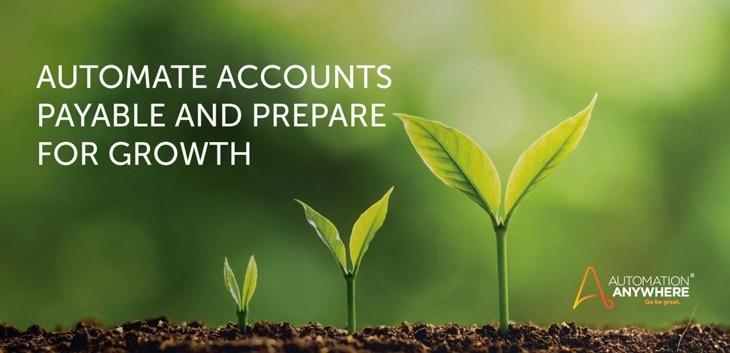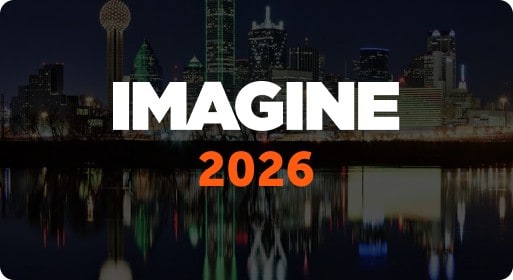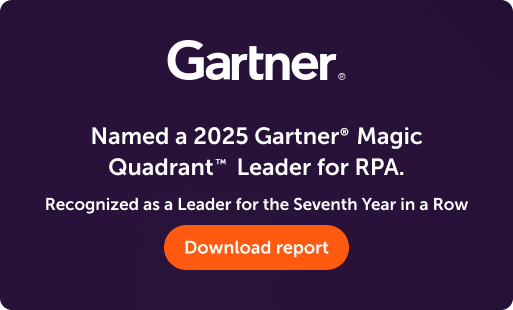- Login
- Search
- Contact Us
-
Have a question? Our team is here to help guide you on your automation journey.
-
Explore support plans designed to match your business requirements.
-
How can we help you?
-
- AI
AI Without the Hype From pilot to full deployment, our experts partner with you to ensure real, repeatable results. Get Started
- Automation Anywhere AI
-
- Solutions
Featured Agentic Solutions
Accounts Payable Invoice automation—No setup. No code. Just results. Accounts Payable
Customer Onboarding Scale KYC/AML workflows. Customer Onboarding
Customer Support Keep queues moving, even at peak load. Customer Support
Healthcare RCM Revenue cycle management that runs itself. Healthcare RCM
- Products
Platform Features
- Agentic process automation (APA)
- Robotic Process Automation (RPA)
- View all Products
-
- Resources
Get Community Edition: Start automating instantly with FREE access to full-featured automation with Cloud Community Edition.
Featured
 Named a 2025 Gartner® Magic Quadrant™ Leader for RPA.Recognized as a Leader for the Seventh Year in a Row Download report Download report
Named a 2025 Gartner® Magic Quadrant™ Leader for RPA.Recognized as a Leader for the Seventh Year in a Row Download report Download report- Become an Expert
- Developer Tools
- Get Support
- View all resources
-
- Partners
Find an Automation Anywhere Partner Explore our global network of trusted partners to support your Automation journey Find a Partner Find a Partner
- Find a Partner
- For Partners
-
Blog
Automate Accounts Payable and Prepare for Growth
Share this:
Navigate to content
It’s well known that businesses require data to plan for the future, and accounts payable is attracting renewed attention from leaders because of its outsized impact on planning growth. Data provides insights about such things as forecasting budgets, controlling corporate spending, reducing fraud, and analyzing cash flow to help businesses better manage their working capital. Cash flow is, of course, a huge issue when scaling companies and accounting firms.
But despite the importance of accounts payable data, many executives are still flying blind. In many accounts payable departments, essential information isn't captured, systems aren't well integrated, and invoice processing is a laborious, manual, repetitive process.
Consequently, decision-makers can't easily access the information they need. It’s no wonder forecasting cash flow is so difficult for big businesses and puts supply chains at real risk. And without modern approaches to compliance, it’s not surprising businesses lose money to fraud year after year.
The blame for this lack of visibility can be laid at the feet of the legacy systems most accounts payable departments use for capturing, managing, and reporting information. More than three-quarters of accounts payable departments manually key and validate invoice data while matching it to purchase orders and receipts.
Traditional accounts payable systems only handle structured data — the kind that comes from paper or electronic spreadsheets, databases, or standardized forms.
But organizations are drowning in semi-structured and unstructured information. Many departments just ignore this data because of the complexity in processing or analyzing it. In fact, this data is referred to as “dark data” because organizations don’t know what it contains.
Bots deliver visibility business leaders need
Robotic Process Automation (RPA) with artificial intelligence (AI) makes it easy for accounts payable to capture, manage, and report on the data that executives need. RPA automates simple, repetitive tasks that can be easily replicated by instructing a software bot to follow a defined set of rules.
Bots interact with systems and applications, just like humans do. Intelligent automation builds on RPA by applying AI technologies that imitate the way the human brain works — technologies such as image processing, pattern recognition, contextual analysis, and natural language processing help bots make decisions or complete tasks.
Using RPA to digitize invoices and accounts payable provides higher visibility into accounts payable data, along with greater control for compliance and security. The modern capabilities of RPA feature cognitive abilities with built-in domain expertise for finding critical information.
A combination of computer vision, optical character recognition (OCR) technology, and fuzzy logic extracts and sorts data while machine learning helps improve the accuracy of captured data. Cognitive automation also helps make certain an intelligent system extracts all unstructured data. And the technology logs and stores the data at each stage of the workflow.
What’s more, the technology eliminates most of the work involved in formatting, generating, and distributing the accounts payable reports executives desire. The technology automatically:
- Collects data from any application, legacy system, browser, or database
- Collates, manages, and organizes reports
- Generates reports at pre-scheduled times
- Shares reports and facilitates collaboration
- Identifies emails that contain reports of interest and assigns them to custom processes
RPA and cognitive automation ensure critical accounts payable information is captured, correct, complete, well organized, timely, and integrated with downstream systems and processes.
Automation gives companies of all sizes the chance to transform accounts payable and invoice management from a tactical operation to a strategic, savings-generating initiative. With these insights, executives can better manage operations, cash, spending, and risks in real-time. And that’s appealing to any cost-conscientious executive.
See how RPA
improves accounts payable.
About Semyon Sergunin
With a background in software development, B2B marketing, and sales, Semyon Sergunin has worked in automation technology for more than 15 years. He drives the global adoption of intelligent automation solutions, including Document Automation and Discovery Bot.
Subscribe via Email View All Posts LinkedInGet to know the Agentic Process Automation System.

For Students & Developers
Start automating instantly with FREE access to full-featured automation with Cloud Community Edition.



